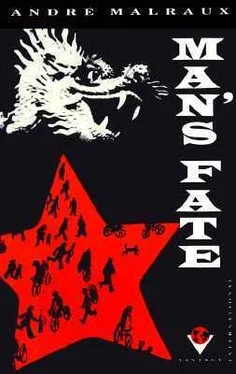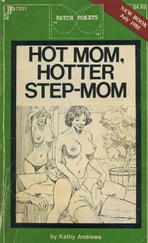Andre Malraux - Man's Fate
Здесь есть возможность читать онлайн «Andre Malraux - Man's Fate» весь текст электронной книги совершенно бесплатно (целиком полную версию без сокращений). В некоторых случаях можно слушать аудио, скачать через торрент в формате fb2 и присутствует краткое содержание. Год выпуска: 1990, Издательство: Vintage, Жанр: Современная проза, на английском языке. Описание произведения, (предисловие) а так же отзывы посетителей доступны на портале библиотеки ЛибКат.
- Название:Man's Fate
- Автор:
- Издательство:Vintage
- Жанр:
- Год:1990
- ISBN:нет данных
- Рейтинг книги:3 / 5. Голосов: 1
-
Избранное:Добавить в избранное
- Отзывы:
-
Ваша оценка:
- 60
- 1
- 2
- 3
- 4
- 5
Man's Fate: краткое содержание, описание и аннотация
Предлагаем к чтению аннотацию, описание, краткое содержание или предисловие (зависит от того, что написал сам автор книги «Man's Fate»). Если вы не нашли необходимую информацию о книге — напишите в комментариях, мы постараемся отыскать её.
As a study of conspiracy and conspirators, of men caught in the desperate clash of ideologies, betrayal, expediency, and free will, Andre Malraux's novel remains unequaled.
Man's Fate — читать онлайн бесплатно полную книгу (весь текст) целиком
Ниже представлен текст книги, разбитый по страницам. Система сохранения места последней прочитанной страницы, позволяет с удобством читать онлайн бесплатно книгу «Man's Fate», без необходимости каждый раз заново искать на чём Вы остановились. Поставьте закладку, и сможете в любой момент перейти на страницу, на которой закончили чтение.
Интервал:
Закладка:
“They know that: no importance.”
He again fell into silence. Gisors avoided questioning him. Ch’en finally went on:
“.. That it’s the first time.”
Gisors suddenly had the impression that he understood; Ch’en felt this:
“No. You don’t understand.”
He spoke French with a guttural accentuation of one- syllable words, which combined startlingly with certain idioms he had picked up from Kyo. He was instinctively holding his arm close to his side: once more he felt the stabbed body which the spring-mattress had caused to rebound against the knife. That meant nothing. He would do it again. In the meantime, however, he yearned for a refuge. But it was only for Kyo that Gisors could feel that deep affection which needs no explanation. Ch’en knew it. How should he express himself?
“You have never killed a man before, have you?” “You know I haven’t.”
That seemed obvious to Ch’en, but today he had begun to distrust such impressions. Yet it seemed to him suddenly that Gisors lacked something. He raised his eyes. The latter was looking up at him, his white hair seeming longer because of the backward toss of his head. Gisors was puzzled by his lack of gestures. This was due to his wound which Ch’en had not mentioned; not that he was suffering from it (a chum of his, an orderly, had disinfected and bound it) but it hampered him. As always when he was reflecting, Gisors was rolling an invisible cigarette between his fingers:
‘‘Perhaps. ”
He stopped, his bright eyes steady. Ch’en waited. Gisors went on, almost brutally:
“I don’t think the memory of a murder is enough to upset you so.”
“It’s clear that he doesn’t know what he’s talking about,” Ch’en tried to tell himself; but Gisors had hit the mark. Ch’en sat down, looked at his feet:
“No,” he said, “I don’t think the memory is enough, either. There’s something else, the essential. I’d like to know what.”
Was that why he had come?
“The first woman you ever slept with was a prostitute, of course?” asked Gisors.
“I’m a Chinaman,” answered Ch’en with rancor.
No, thought Gisors. Except, perhaps, for his sexuality, Ch’en was not Chinese. The emigrants from all countries with which Shanghai overflowed had shown Gisors to what extent a man becomes separated from his nation in a national way, but Ch’en no longer belonged to
China, not even in the way he had left it: a complete liberty gave him over completely to his mind.
“What did you feel, afterwards?” asked Gisors.
Ch’en clenched his fists.
“Pride.”
“At being a man?”
“At not being a woman.”
His voice no longer expressed rancor, but a complex contempt.
“I think you mean,” he went on, “that I must have felt myself. apart?”
Gisors avoided an answer.
“. Yes. Terribly. And you are right to speak of women. Perhaps one thoroughly despises the man one kills. But less than the others.”
“Than the ones who don’t kill?”
“Than the ones who don’t kill: the weaklings.”
He was pacing again. The two last words had fallen like a load that one drops, and the silence spread around them; Gisors was beginning to feel, not without melancholy, the isolation that Ch’en was speaking of. He sud- denlv remembered that Ch’en had told him he had a hor- «>
ror of hunting.
“Didn’t you feel horror at the blood?”
“Yes. But not only horror.”
He had spoken these words while pacing away from Gisors. He turned round on a sudden and, considering the phcenix, but as directly as though he were looking Gisors straight in the eyes, he asked:
“So what? I know what one does with women when they want to continue to possess you: one lives with them. What about death?”
Even more bitterly, but without taking his eyes off the phcenix:
“Live with it?"
The bent of Gisors’ mind made him inclined always to help out those who came to him; and he felt affection for Ch’en. But he was beginning to see the thing clearly: action in the shock groups was no longer enough for the young man, terrorism was beginning to fascinate him. Still rolling his imaginary cigarette, #9632; his head bent forward as though he were studying the carpet, a white shock of hair beating against his slender nose, he said, trying to give his voice a tone of detachment:
“You think you won’t get away from it. ’’
But his nerves getting the better of him, he spluttered in conclusion:
“… and it’s against that … torment that you’ve come to.. me for help.”
Silence.
“A torment? No/’ Ch’en finally said, between his teeth, “A fatality?”
Again silence. Gisors felt that no gesture was possible, that he could not take his hand, as he used to. In his tum he made a decision, and said with weariness, as though he had suddenly acquired the habit of anguish:
“Then, you must think it through, and carry it to the extreme. And if you want to live with it.
“I shall soon be killed.’’
Isn’t that what he wants above all? Gisors wondered. He aspires to no glory, to no happiness. Capable of winning, but not of living in his victory, what can he appeal to if not to death? No doubt he wants to give it the meaning that others give to life. To: die on the highest possible plane. An ambitious soul, sufficiently lucid, sufficiently separated from men or sufficiently a.ficted to despise al the objects of his ambition, and his ambition itself?
“If you want to live with this. fatality, there is only one recourse: to pass it on.”
“Who would be worthy of it?” asked Ch’en, still between his teeth.
The air was becoming more and more weighted, as if everything murderous that these words called forth were present there. Gisors could say nothing more: words would have sounded false, frivolous, stupid.
“Thank you,” said Ch’en. He bowed before him, with his whole upper body, Chinese fashion (which he never did) as though he preferred not to touch him, and left.
Gisors went back and sat down, began again to roll his cigarette. For the first time he found himself face to face, not with fighting, but with blood. And as always, he thought of Kyo. Kyo would have found the universe in which Ch’en moved unbreathable. Was he really sure of this? Ch’en also detested hunting, Ch’en also had a horror of blood-before. How well did he know his son at this depth? Whenever his love played no role, whenever he could not refer to many memories, he fully realized that he did not know Kyo. He was seized with an intense desire to see him again-the desire one has to see one’s dead a last time. He knew he had gone.
Where? Ch’en’s presence still animated the room. He had thrown himself into the world of murder, from which he would never emerge: with his passion, he was entering upon the life of a terrorist as into a prison. Before ten years he would be caught-tortured or killed; until then he would live like a man willfully obsessed, in a world of decision and death. He had lived by his ideas; now they would kill him.
And it was indeed this that made Gisors suffer. If Kyo went in for killing, that was his role. And if not, it didn’t matter: what Kyo did was well done. But he was appalled by this sudden sensation, this certainty of the fatality of murder, an intoxication as terrible as his own was innocent. He felt how inadequately he had brought to Ch’en the relief which he sought, how solitary murder is-how great a distance was growing, by virtue of this torment, between himself and Kyo. For the first time, the phrase he had so often repeated, “There is no knowledge of beings,” attached itself in his mind to the face of his son.
As for Ch’en, did he really know him? He did not at all believe that memories enable one to understand men. There was Ch’en’s early education, which had been religious; when he had begun to be interested in the adolescent orphan-his parents had been killed in the pillage of Kalgan-Ch’en, insolent and taciturn, had just come from the Lutheran college. He had been the pupil of a consumptive intellectual who had reached pastorship late in life, and who was struggling patiently at the age of fifty to overcome, by charity, an intense religious anxiety. Obsessed by the shame of the body which tormented Saint Augustine, of the degraded body in which one must live with Christ-through horror of the ritual civilization of China which surrounded him and made the appeal of the true religious life even more imperious — this pastor had worked out in his anguished mind his own image of Luther, on which he would occasionally hold forth to Gisors: “There is life only in God; but man, through sin, is degraded to such a point, so irremediably sullied, that to attain God is a kind of sacrilege. Whence Christ, whence his eternal crucifixion.” Which left grace, that is to say limitless love or terror, according to the strength or weakness of hope; and this terror was a new sin. Which also left charity; but charity does not always suffice to dispel anguish.
Читать дальшеИнтервал:
Закладка:
Похожие книги на «Man's Fate»
Представляем Вашему вниманию похожие книги на «Man's Fate» списком для выбора. Мы отобрали схожую по названию и смыслу литературу в надежде предоставить читателям больше вариантов отыскать новые, интересные, ещё непрочитанные произведения.
Обсуждение, отзывы о книге «Man's Fate» и просто собственные мнения читателей. Оставьте ваши комментарии, напишите, что Вы думаете о произведении, его смысле или главных героях. Укажите что конкретно понравилось, а что нет, и почему Вы так считаете.











